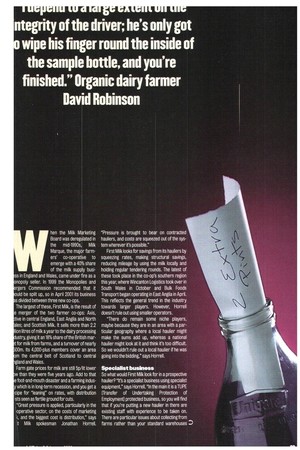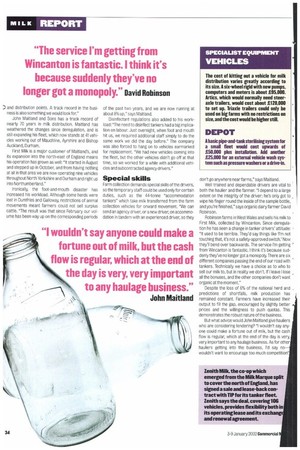hen the Milk Marketing Board was deregulated in the mid-1990s,
Page 33

Page 34

If you've noticed an error in this article please click here to report it so we can fix it.
Milk Marque, the major farmers' co-operative to emerge with a 40% share of the milk supply busiss in England and Wales, came under fire as a nopoly seller. In 1999 the Monopolies and rgers Commission recommended that it ould be split up, so in April 2001 its business s divided between three new co-ops.
The largest of these, First Milk, is the result of merger of the two farmer co-ops: Axis, tive in central England, East Anglia and North Lee; and Scottish Milk. it sells more than 2.2 lion litres of milk a year to the dairy processing ustry, giving it an 18% share of the British mar t for milk from farms, and a turnover of nearly 00m. Its 4,000-plus members cover an area m the central belt of Scotland to central gland and Wales.
Farm gate prices for milk are still 5p/lit lower w than they were five years ago. Add to that • foot-and-mouth disaster and a farming Induswhich is in long-term recession, and you get a cipe for "leaning" on rates, with distribution sts seen as fertile ground for cuts.
"Great pressure is applied, particularly in the ,operative sector, on the costs of marketing and the biggest cost is distribution," says it Milk spokesman Jonathan Horrell.
"Pressure is brought to bear on contracted hauliers, and costs are squeezed out of the system wherever it's possible."
First Milk looks for savings from its hauliers by squeezing rates, making structural savings, reducing mileage by using the milk locally and holding regular tendering rounds. The latest of these took place in the co-op's southern region this year, where Wincanton Logistics took over in South Wales in October and Bulk Foods Transport began operating in East Anglia in April. This reflects the general trend in the industry towards larger players. However, Horrell doesn't rule out using smaller operators.
"There do remain some niche players, maybe because they are in an area with a particular geography where a local haulier might make the sums add up, whereas a national haulier might look at it and think it's too difficult. So we wouldn't rule out a local haulier if he was going into the bidding," says Horrell.
Specialist business So what would First Milk look for In a prospective haulier? "It's a specialist business using specialist equipment," says Horrell. "In the main it is a TUPE [Transfer of Undertaking Protection of Employment] protected business, so you will find that if you're putting a new haulier in there are existing staff with experience to be taken on. There are particular issues about collecting from farms rather than your standard warehouses 0
) and distribution points. A track record in the business is also something we would look for."
John Maitland and Sons has a track record of nearly 70 years in milk distribution. Maitland has weathered the changes since deregulation, and is still expanding his fleet, which now stands at 41 vehicles working out of Maud-Hine, Ayrshire and Bishop Auckland, Durham.
First Milk is a major customer of Maitland's, and its expansion into the north-east of England means his operation has grown as well: "It started in August and stepped up in October, and from having nothing at all in that area we are now operating nine vehicles throughout North Yorkshire and Durham and right up into Northumberland."
Ironically, the foot-and-mouth disaster has increased his workload. Although some herds were lost in Dumfries and Galloway, restrictions of animal movements meant farmers could not sell surplus cattle. "The result was that since February our volume has been way up on the corresponding periods of the past two years, and we are now running at about 8% up," says Maitland.
Disinfectant regulations also added to his workload: "The need to disinfect tankers had a big implication on labour. Just overnight, when foot and mouth hit us, we required additional staff simply to do the same work we did the day before." The company was also forced to hang on to vehicles earmarked for replacement. "We had new vehicles coming into the fleet, but the other vehicles didn't go off at that time, so we worked for a while with additional vehicles and subcontracted agency drivers."
Special skills
Farm collection demands special skills of the drivers, so the temporary staff could be used only for certain duties, such as the 44-tonne "accommodation tankers" which take milk transferred from the farm collection vehicles for onward movement. "We can send an agency driver, or a new driver, on accommodation in tandem with an experienced driver, so they don't go anywhere near farms," says Maitland.
Well trained and dependable drivers are vital to both the haulier and the farmer. "I depend to a large extent on the integrity of the driver; he's only got to wipe his finger round the inside of the sample bottle, and you're finished," says organic dairy farmer David Robinson.
Robinson farms in West Wales and sells his milk to First Milk, collected by Wincanton. Since deregulation he has seen a change in tanker drivers' attitude: "It used to be terrible. They'd say things like `I'm not touching that, it's not a safety-approved switch.' Now they'll bend over backwards. The service I'm getting from Wincanton is fantastic. I think it's because suddenly they've no longer got a monopoly. There are six different companies passing the end of our road with tankers. Technically we have a choice as to who to sell our milk to, but in reality we don't. If I leave 1 lose all the bonuses, and the other companies don't want organic at the moment."
Despite the loss of 6% of the national herd and predictions of shortfalls, milk production has remained constant. Farmers have increased their output to fill the gap, encouraged by slightly better prices and the willingness to push quotas. This demonstrates the robust nature of the business.
But what advice would John Maitland give hauliers who are considering tendering? "I wouldn't say anyone could make a fortune out of milk, but the cash flow is regular, which at the end of the day is very, very important to any haulage business. As for other hauliers getting into the business, I'd say no— wouldn't want to encourage too much competition!'




























































































































